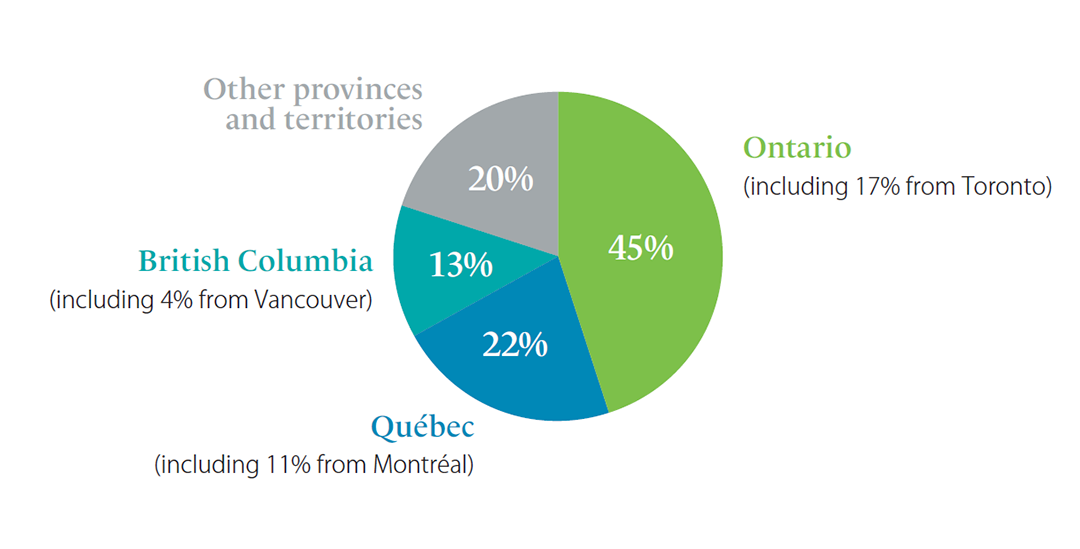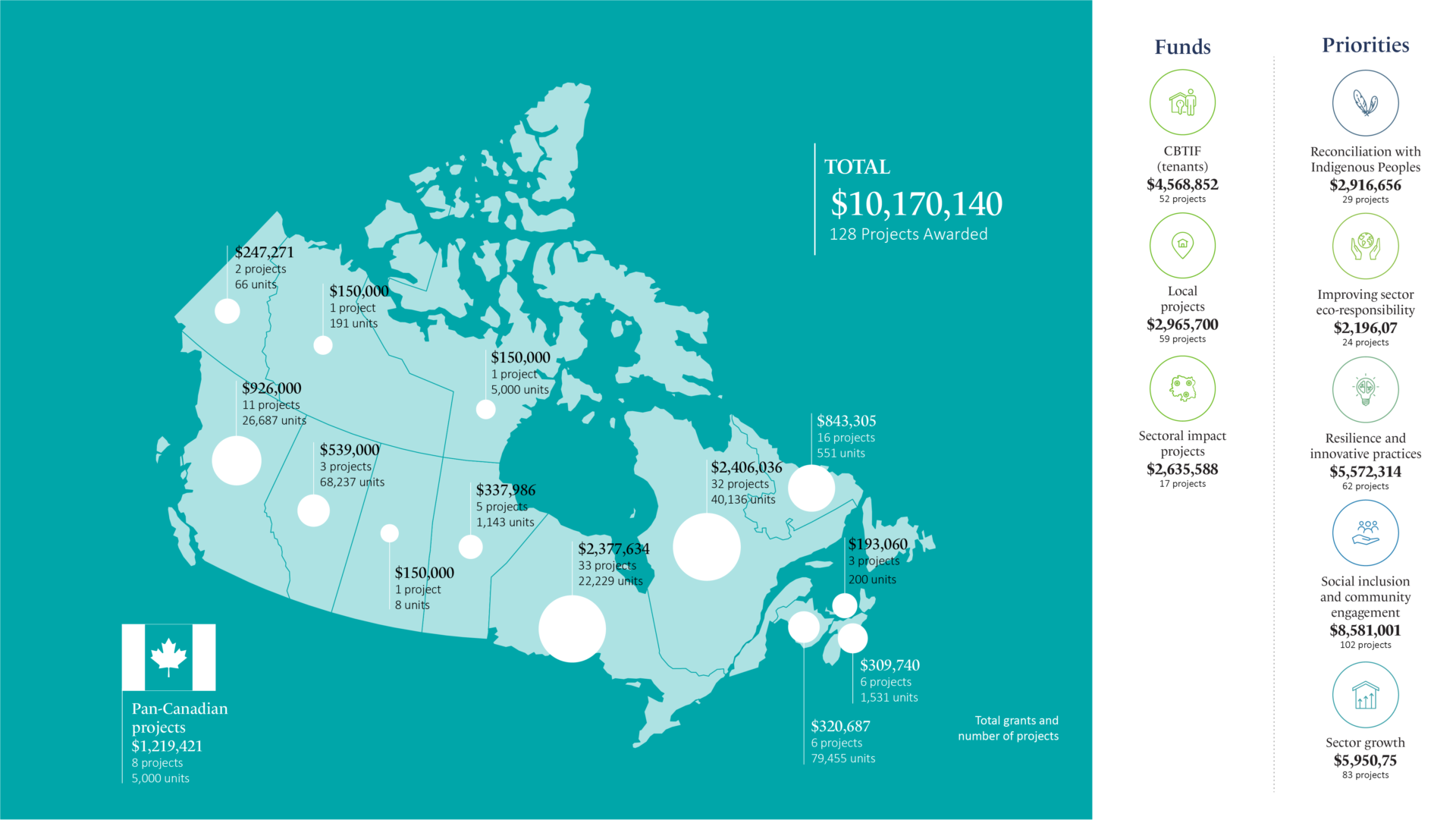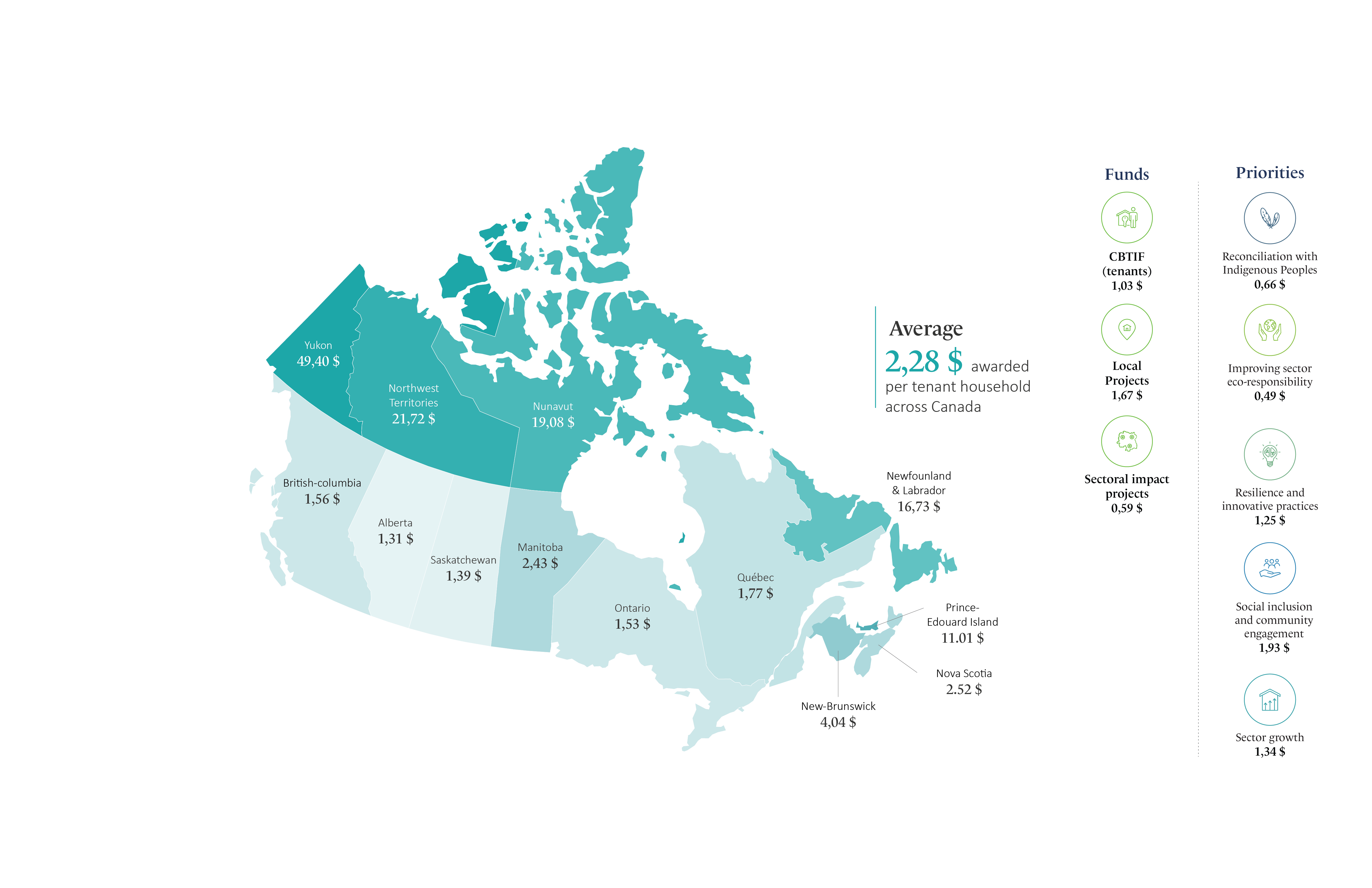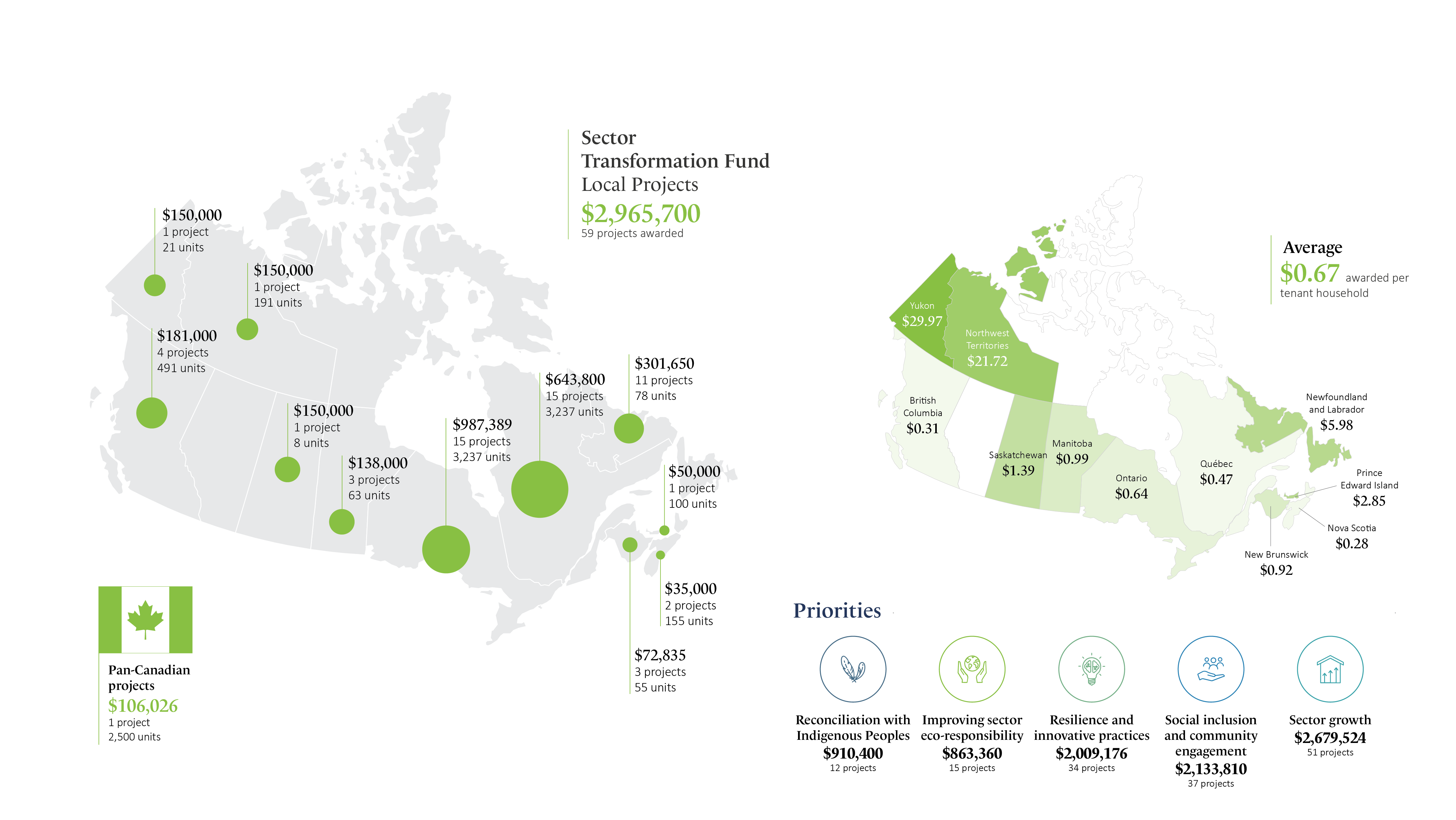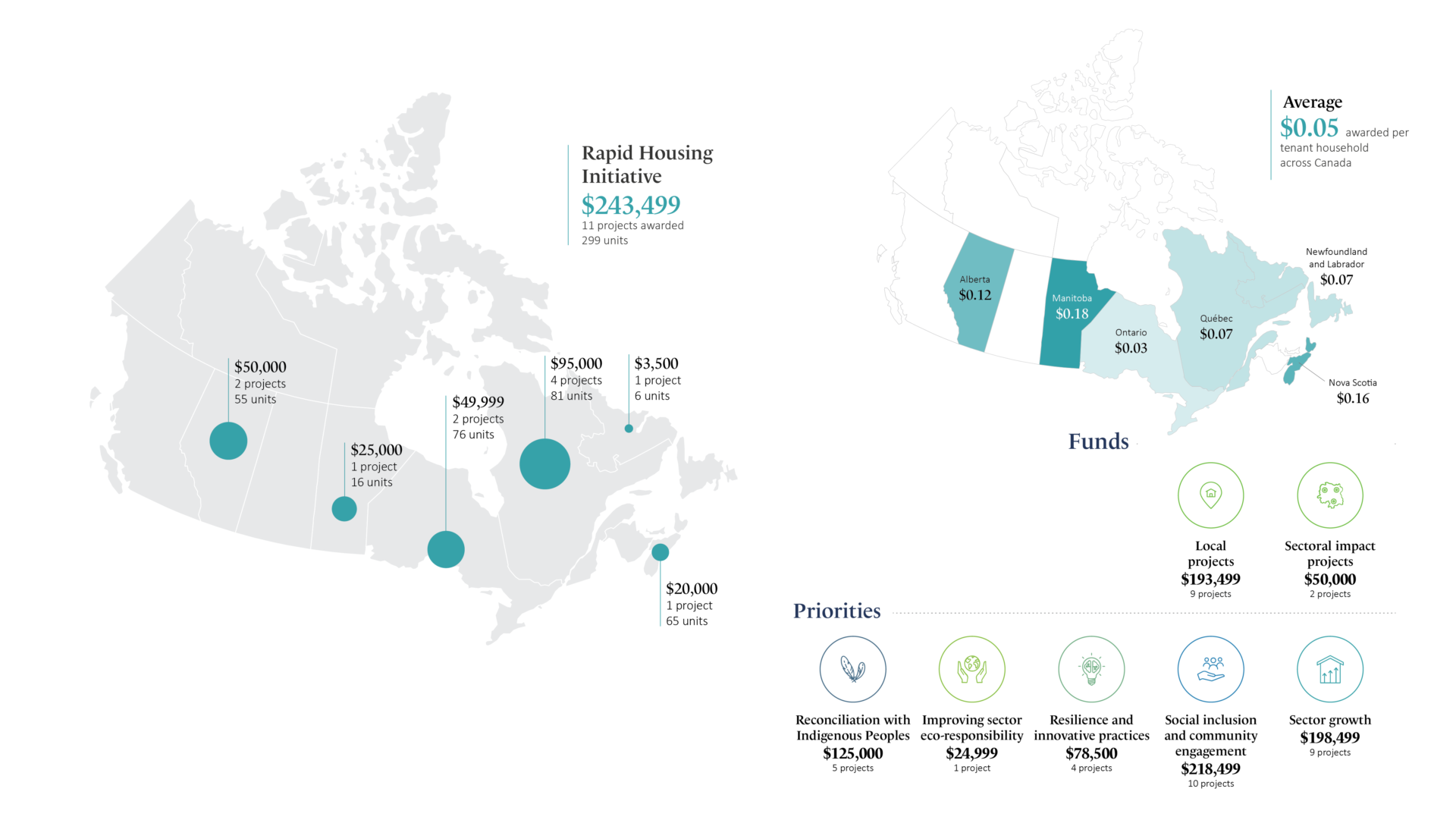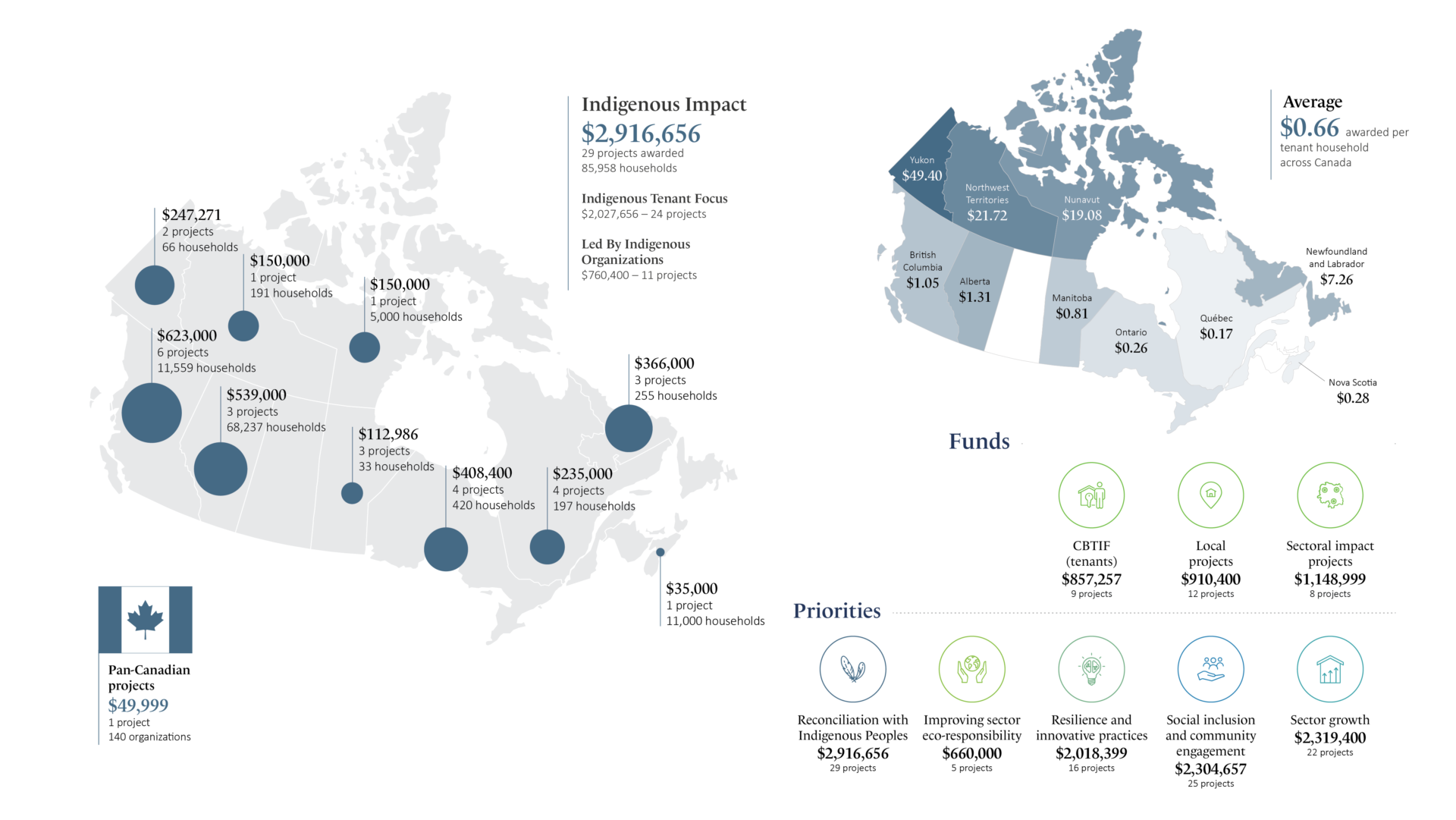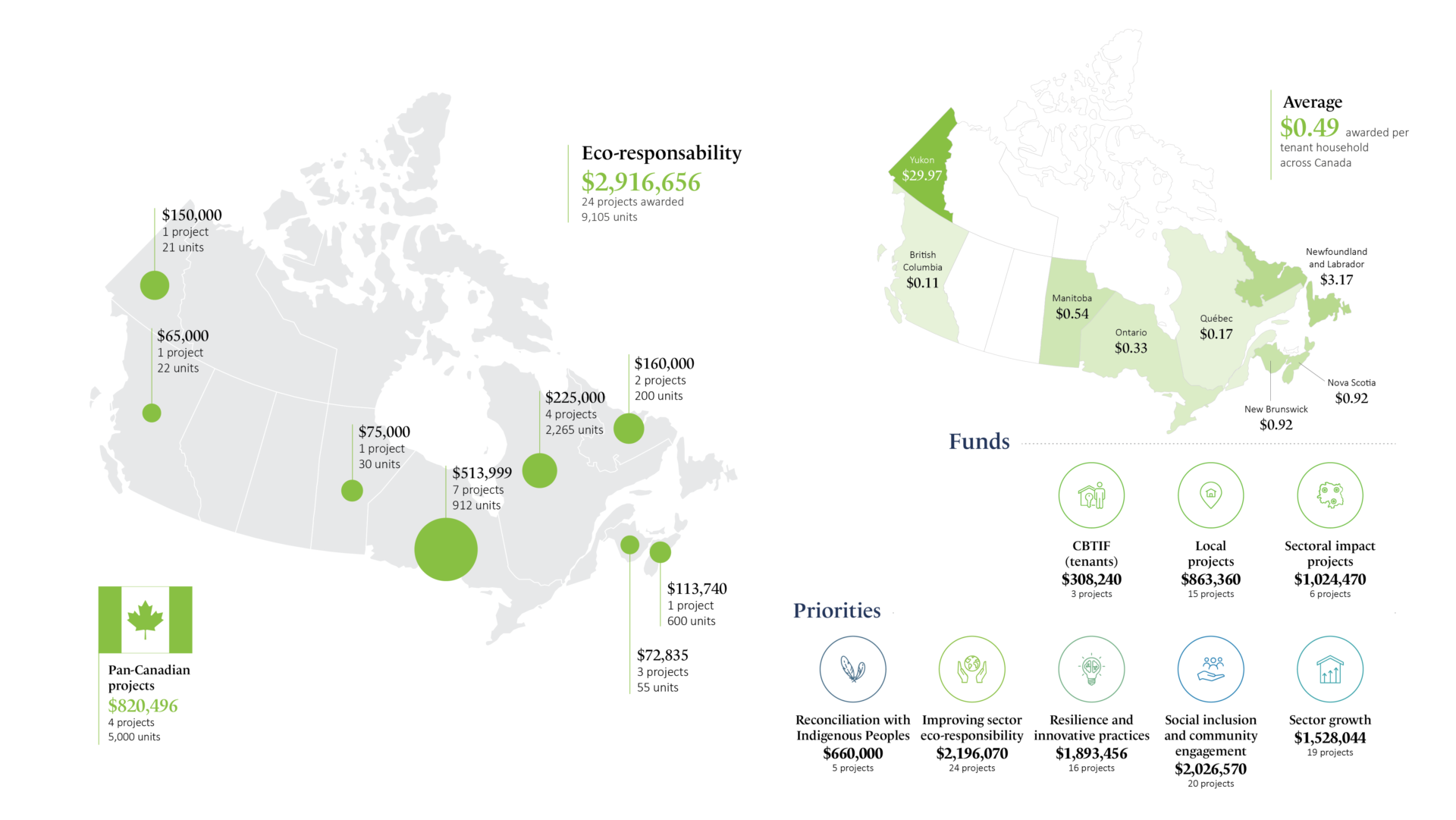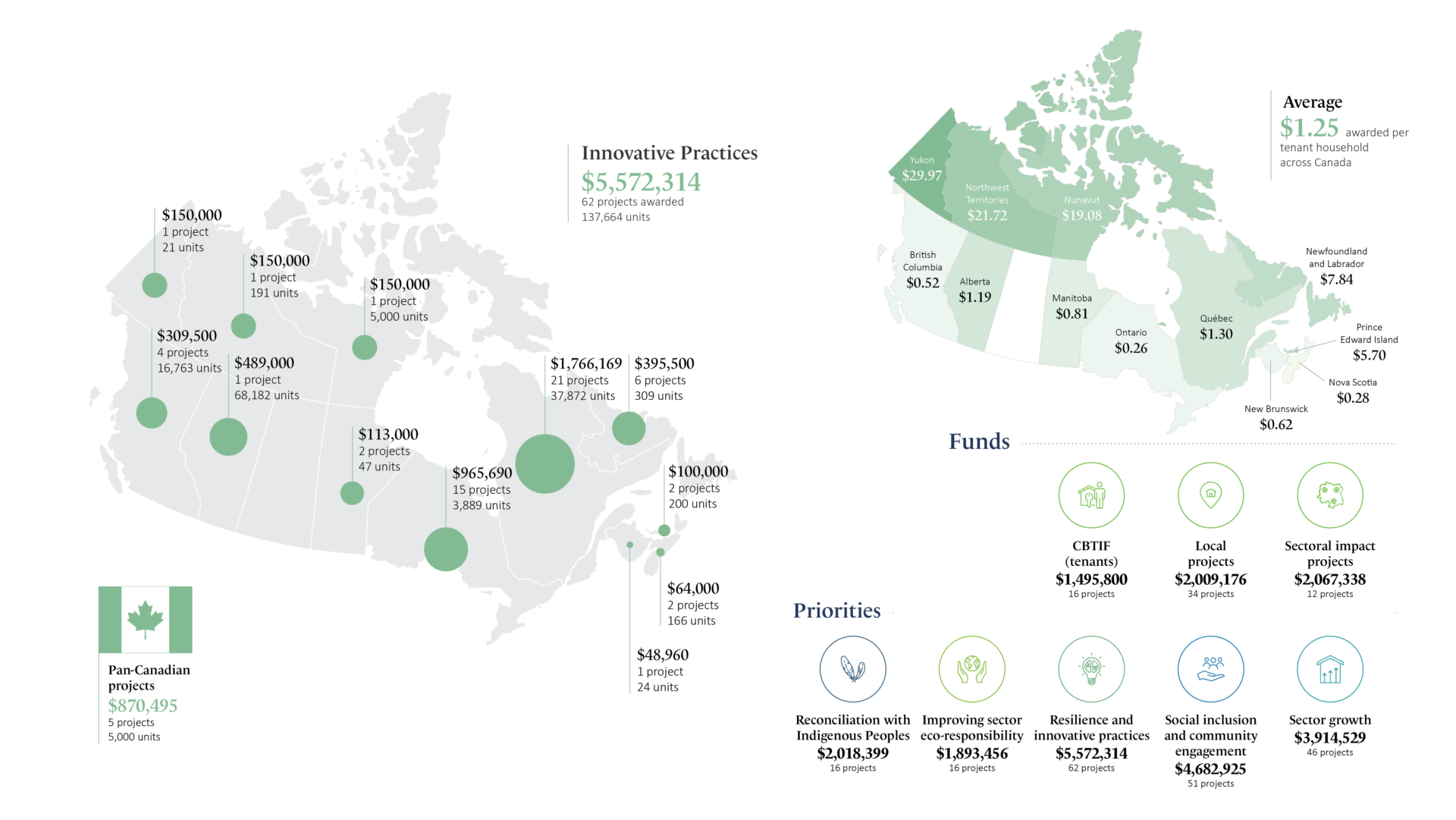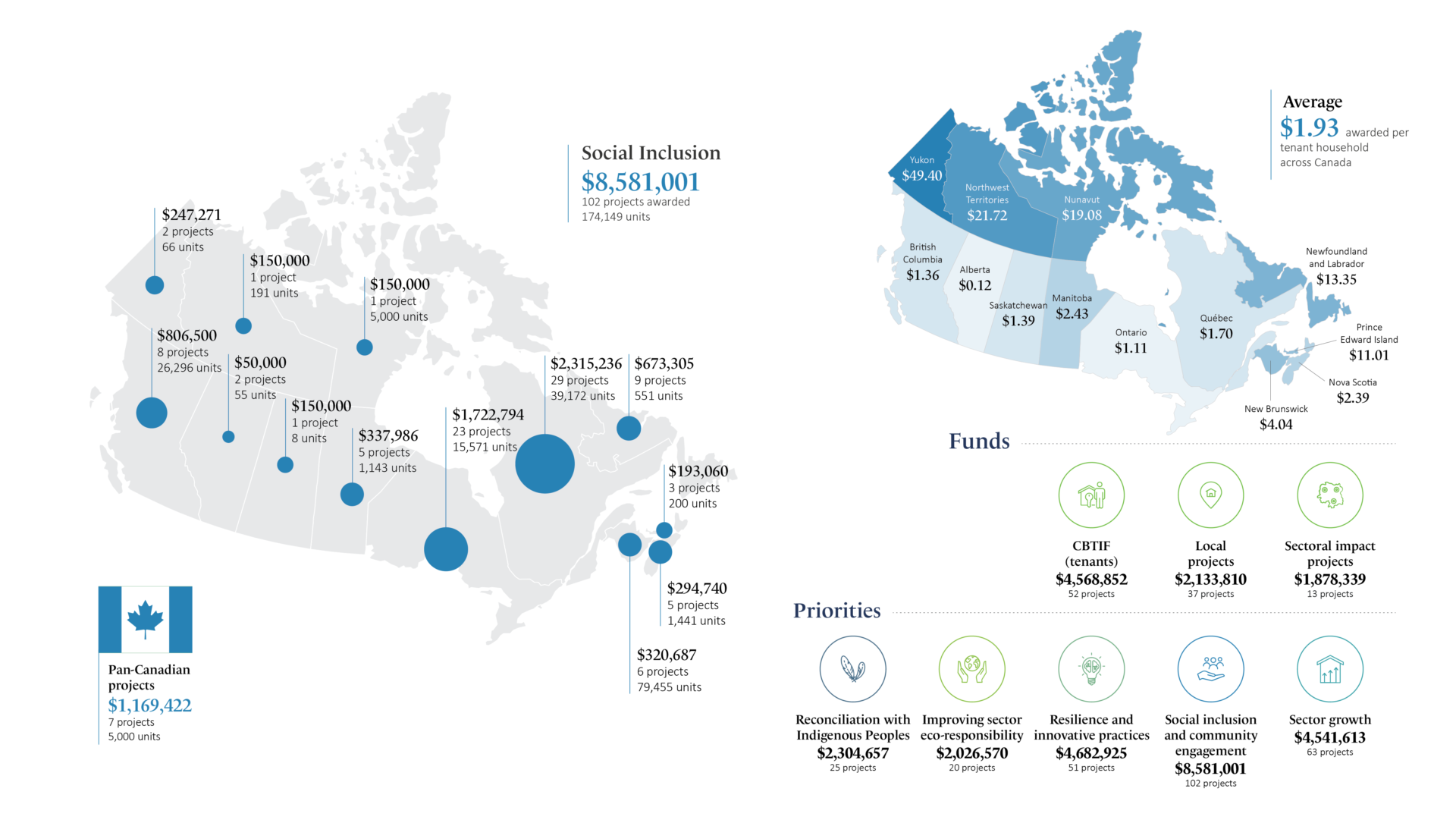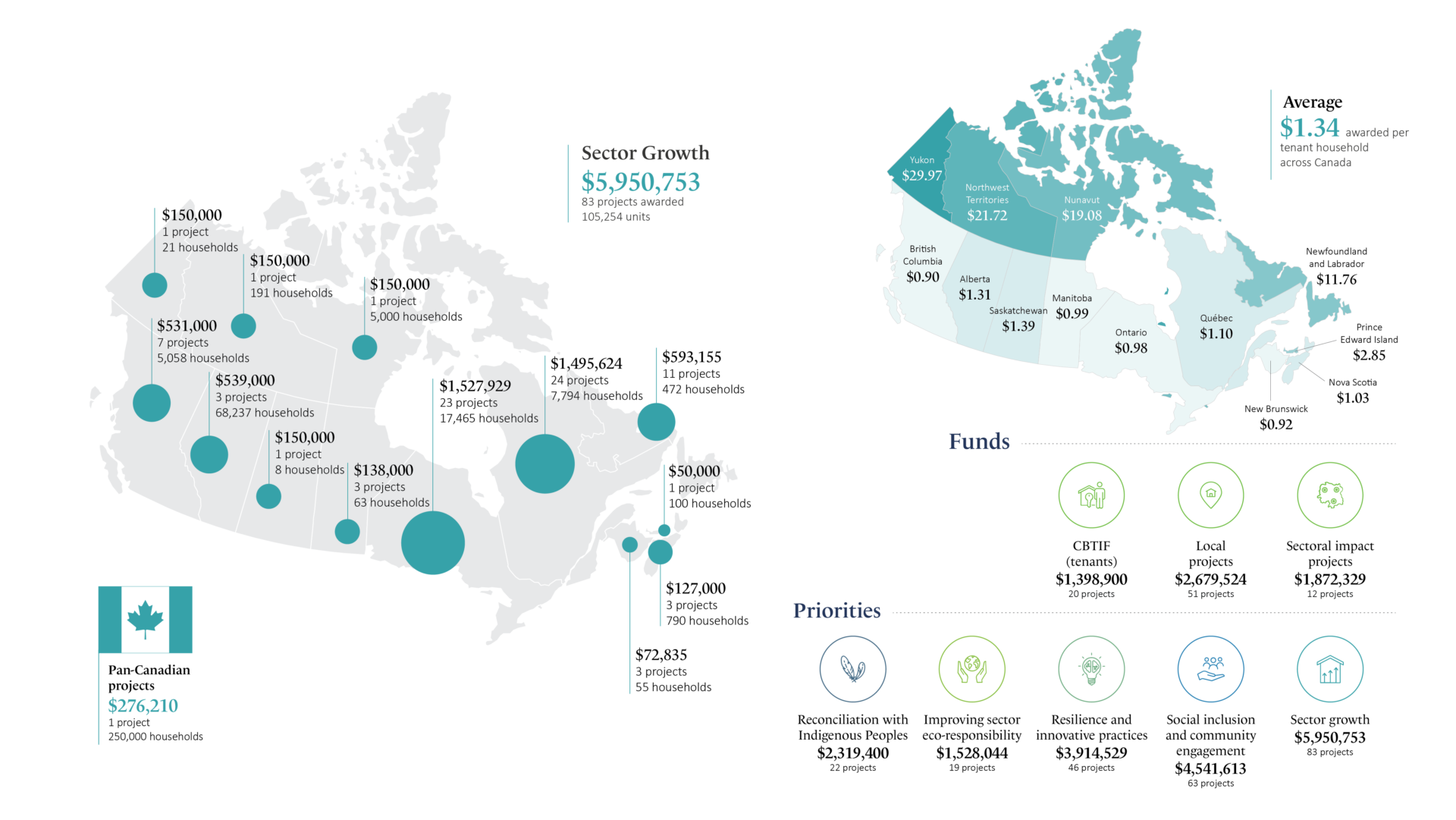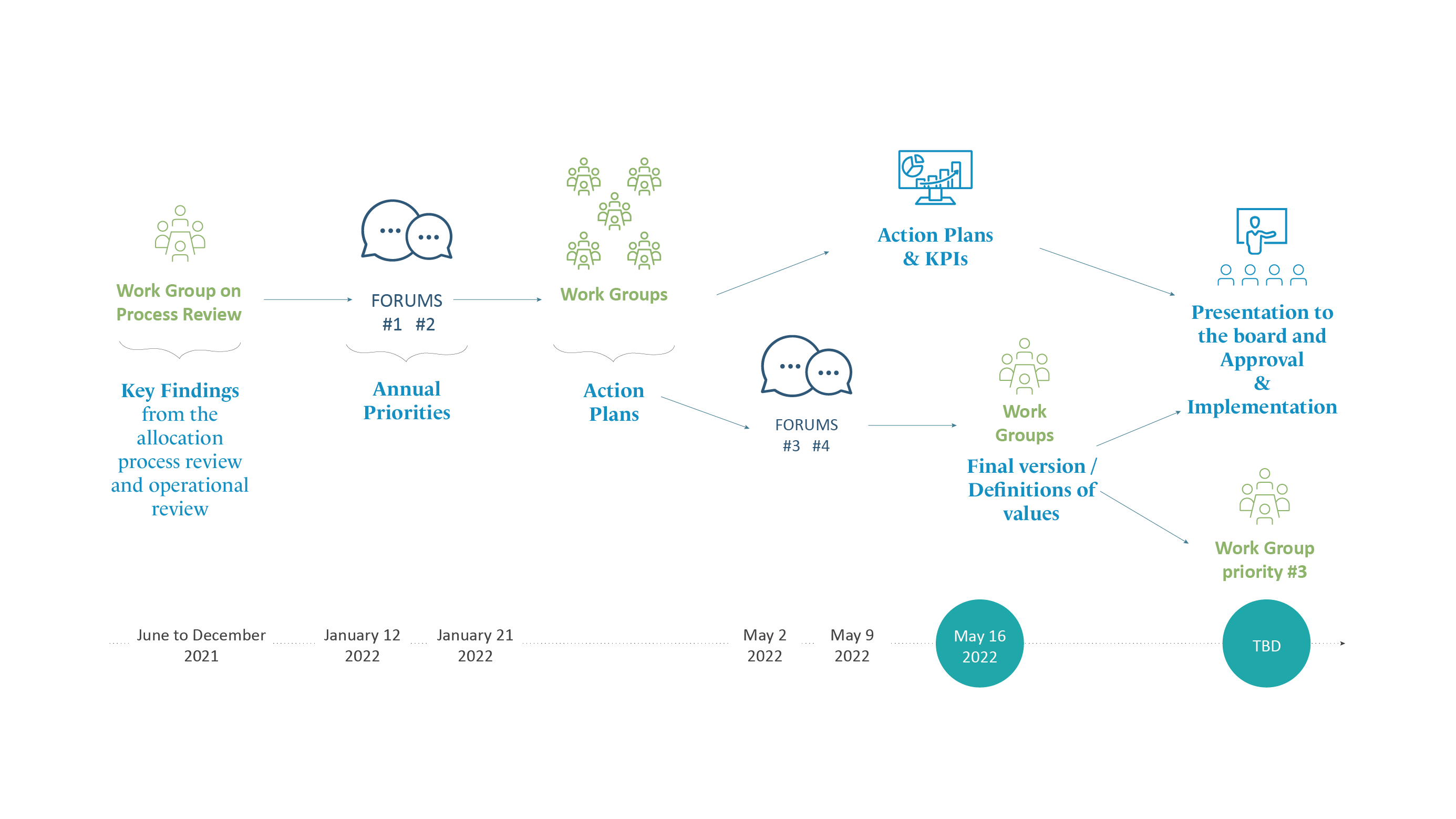Message from the President and Executive Director

Tim Ross
President

Stéphan Corriveau
Executive Director
The warning signs were already plentiful in the early 2000s, and while many of those involved in the community housing arena have sounded the alarm repeatedly over the past two decades, no major effort has been undertaken to prevent the crisis.
Today, millions of households and individuals are living in increasingly precarious conditions, if not outright homelessness, and authorities seek simple, inexpensive, and expeditious solutions within an area where these three variables almost never intersect.
The sources of the issue are well known: speculation, concentration of land and property ownership, financialization, commodification, renoviction, short-term tourist accommodation, globalization, tax incentives, discrimination, etc.
The answers to the problem are also known: community housing, land trusts, lease registries, rent control, fair taxation, humane and social urban planning, inclusion and diversity, etc.
And although more and more political, financial and legislative players are finally acknowledging the issue, the means put into action remain quite modest when compared to the magnitude of the task at hand. While the public authorities deserve a large part of the responsibility, our movement must have the courage to recognize that it has been indolent in excusing its lack of initiatives under the pretext of a lack of governmental support. Yet we have means at our disposal that could contribute to at least mitigating the crisis in part. The legitimacy of our movement relies on acting without delay and assuming a leadership position regarding this matter by taking the necessary measures to change the situation.
It is within this framework that The Community Housing Transformation Centre was created and has operated for the past three years.
Using ambition, but setting aside any illusions, the Centre has continued its work in 2021–2022 to facilitate the quantitative development and qualitative evolution of community housing. Whether through the provision of funding or services, all regions and all segments of community housing have benefited from our intervention, our tools and this year’s $10 million allocation.
Without pretension, the Centre, its team and its Board of Directors have much to be proud of when reflecting on its first 36 months of existence. We are at the stage of our development where it is possible to evaluate the quality and relevance of the projects we have funded, the potential of the many partnerships we have established and the paths we can follow based on these experiences. While the team and the board consistently remain focused on the vision, mission and strategic plan of the Centre, what sets them apart is their ability to maintain the organizational agility necessary to continuously adjust our operating functions and seize emerging opportunities in order to increase the impact of our interventions.
This message would be incomplete without extending my sincerest thanks to the Centre’s member groups as well as the growing number of institutional, financial and community partners who choose to work in close cooperation with us. These include the Canada Mortgage and Housing Corporation, Housing Nova Scotia, the Federation of Canadian Municipalities, Vivre en ville, the Housing Investment Corporation, St. FX University Extension Department, the City of St. John’s and the Indigenous Centre for Cumulative Effects.
As President and Executive Director, we must also acknowledge the Centre’s volunteers, staff, management team and directors, every single one of which actively contributes to its success.
Tim Ross
President
Stéphan Corriveau
Executive Director
Introduction
The right tool for the job
“Transformation” is a catch-all word that leaves many confused and opens the door to interpretation when it comes to claiming it.
For the Centre, transformation manifests itself in two ways:
The first targets community housing actors individually. It is a matter of the strategies, actions and measures which organizations have identified as needing adjustment to reflect the realities in which they operate.
To that end, as of December 2019, the Centre has been offering grants and technical services to groups that request them.
However, transforming the sector requires more than just transforming individual actors. To be sustainable and meaningful, transformation requires the evolution of the sector’s infrastructure and dynamics.
To act at this level, the Centre must develop its own means of intervention and devote a significant portion of its resources to projects that bring about large-scale change, even if it means reducing the amount of money available for projects that have less widespread impact.
To illustrate what the evolution of the Centre’s programming implies, imagine a pyramid with three levels. These are, from bottom to top, the Reactive, Catalytic and Propositional dimensions. Until now, we have devoted most of our time and money to the first level, occasionally working on the middle level and very lightly exploring the upper level of the pyramid.
Gradually, the levels of energy devoted to each tier will be reversed so that, over the next 24 months, the bulk of our resources will be allocated to the top tier.
The dimensions of action

Reactive
Catalytic
In this context, we would describe the Centre’s intervention as catalytic. We act, depending on the case, as a facilitator to provide the community with the means to carry out this common project (to set up an association or a federation, for example) or as an actor. In the latter case, it is the Centre itself that carries out the action (for example, by creating a self-assessment grid, by offering the computer infrastructure for a shared service, etc.).
Propositional
For this type of intervention, the Centre plans the discussion, facilitates it and contributes to the identification and eventually the joint operationalization of the conclusions collected from that discussion.
Our
vision
• Reconciliation with Aboriginal Peoples
• Eco-responsibility
• Resilience and innovation
• Social inclusion and community action
• Sector growth
In addition to these priorities, the Centre’s organizational management must live up to our vision for the sector by establishing state-of-the-art governance, management, communication and organizational practices, among others.
Our
mission
Our activities seek to support and encourage community housing actors in their efforts to achieve social action, economic viability, growth and efficiency, while recognizing their respective identities.
We accomplish this in two ways. On one hand, we support groups in the sector using technical tools and grants; on the other, we provide input and facilitate the development of new concepts and the emergence of partnerships.
The year 2021-2022 in numbers
Relationships & partnerships
Breaking out of organizational ruts, building alliances, creating leverage
Building relationships and partnerships to facilitate transformation at all levels of the sector
Although more discreet, networking, partnership, and engagement activities are probably more likely to generate the desired evolution within the sector.
Indeed, while you can refurbish a ship and make it more efficient, it is still the environment that facilitates or complicates its navigation.
And this environment, like the tide, makes all the boats go up or down.
Working in the context of a partnership means giving ourselves the means to improve ship construction standards, but also the ability to draw up charts, identify the safest routes, and even influence the environment by installing canals, locks or ports that facilitate navigation.
It is this vision that explains the increasing energy we are devoting to identifying new partnerships and making existing ones work.
Large-scope partnerships
The Plancher approach, because the whole is more than the sum of its parts
Pooling our real estate, financial and organizational assets will increase our resources tenfold. This is the conclusion reached by the Plancher process, which has been thought out and planned since September 2021 and will be carried out in the spring of 2022 by the Centre in collaboration with Québec community housing stakeholders.
Through meetings and discussions, more than 250 people from 180 organizations have contributed to this conclusion.
The process, which was somewhat out of the ordinary, has made it possible to conceptualize the foundations of different models of collaboration which, once in place, will have a real impact on the expansion and resilience of the sector. In practice, we are talking about new types of financing, as well as new methods of growth for real estate acquisition and construction.
To ensure that we have the capacity to meet the challenges associated with implementing these new practices, the Centre has decided to dedicate all its Québec-specific sector impact funds to this project over the next five years. We hope that by the summer of 2023, the first shared services will be operational.
This innovative approach and the process used to arrive at these decisions are currently being documented to inspire similar approaches elsewhere in Canada.
In Nova Scotia: a fund and a future provincial association
This year, the Centre, in partnership with the government of Nova Scotia, launched the Nova Scotia Community Housing Growth Fund.
The fund will make more than $2.6 million available to groups within the province by April 2024.
Within the context of this adventure, the Centre is providing its expertise in managing and allocating community housing funds and is committed to funding the province’s sector at the same rate as it did from 2020 to 2022 for another two years. The Nova Scotia Department of Municipal Affairs and Housing is supplementing the funding and covering administrative costs.
Not coincidentally, the emergence of this fund coincides with the culmination of the “Building Together” initiative, which the Centre has been funding since 2020. This process aims to organize the community housing groups of this province within a Nova Scotia association. Scheduled for the fall of 2022, the new association will receive seed funding from the Community Housing Growth Fund. The balance of funds is intended to support organizational development initiatives, research and seed funding for new community housing projects.
The success of the “Building Together” project is due in large part to the outstanding participation of the St. FX University Extension Department since 2020, both as partner and contributor.
Relying on communication to grow
The medium is the message. The analysis that led McLuhan to this conclusion nearly 60 years ago is truer than ever today.
The evolution of the Centre’s thinking and activities therefore requires a similar evolution in terms of communication.
While we have achieved a respectable level of recognition for a structure as young as ours, there is still a lot of work to be done to ensure that all organizations in the sector are aware of our existence, to ensure that they understand the services we provide, and even more so to ensure that they grasp our vision and mission.
In short, we still have a lot of work to do in this area.
Our website redesigned
Throughout the year, progress has been made on the redesign of our website. A committee, made up of representatives from the Centre’s management, members of the communications team and employees from a specialized external firm, worked on a new structure and a new aesthetic for our virtual showcase. The new website will be online in the fall of 2022 with a brand-new design.
Since its inception, our website has been in constant evolution, reflecting the rapid growth that the Centre has experienced. We are now ready present a website that is easier to navigate, more visually harmonious, and more responsive to the needs of visitors.
In addition to providing reliable, varied and continually updated content, the website allows organizations to complete their grant application, access the self-assessment tool and build their action plan. Funded groups can now submit their reports through the website, as can external auditors. In addition, the documents required by the allocation committee are now available online. These improvements were made possible by hiring a resource whose role is to ensure that the system is working properly and to respond to any technical problems that may arise.
On the content side, while there is still much to do, some changes are already visible:
• More original reporting on the projects we fund;
• More articles on topics relevant to the housing sector;
• New pages to disseminate information about our new programs;
• Revised materials explaining our funds and services.
In all, over 96,000 pages of the site were accessed throughout the year with a rate of 2.24 pages per visit, which corresponds to the average for non-profit websites.
These visits are successful because they last an average of 2.14 minutes, which is almost twice as long as the average. This means that our website is of interest to our audience and is an effective tool in communicating our mission.
Website audience
Social media: more work to be done
Our social media presence has remained stable in 2021–2022. We continue to primarily use Facebook, Twitter, and LinkedIn to disseminate information about our activities.
However, to reach a broader audience, the Centre would benefit from an increased presence across social media platforms. As such, we need to invest greater effort in expanding our use of these communication channels. One of our goals for the coming year is to increase the number and frequency of our posts on these platforms.
The newsletter is still popular
The newsletter is an important promotional tool for publicizing our programs and mobilizing the community around initiatives led by our partners. In it, we have continued to highlight our media presence, special projects, as well as webinars, conferences and workshops relevant to the sector.
This monthly information tool continues to perform well. Our French-speaking audience has doubled since last year, while the English-speaking readership has increased by 80%!
Having thousands of subscribers is great, but what really counts is how many subscribers open and read the newsletter, which is called the “open rate.” The open rate for the French version is up slightly to 43%, while the open rate for the English version has remained at 32%. These results are excellent when compared to the non-profit sector average of 25%.
What’s more, the unsubscribe rates of 0.1% for the French newsletter and 0.4% for the English newsletter show that the content of our publications is of interest to our readership.
Given the abundance of news to be included in this e-newsletter, we plan to increase its frequency of publication as well as the number of targeted mailings on specific projects or topics depending on the audience. In the wake of the website redesign, there may also be changes to the newsletter’s aesthetic in the coming year.
Partnerships, visibility, events
Increasingly sophisticated virtual events
For a second year in a row, the COVID-19 pandemic unfortunately determined the conditions of the Centre’s event-related visibility and presence.
The use of virtual meetings remained the norm, but their greater sophistication still gave the Centre visibility and allowed for some level of networking. We hosted virtual booths, answered questions from attendees and disseminated information about our activities.
In the end, the Centre was present and participated, in one form or another, in about 30 events of varying sizes across the country, on a multitude of topics related to community housing and the Centre’s priorities. As a result, we have had significant visibility as speakers, panellists, and sponsors in 22 of these events.
Of these, several are worth highlighting:
- The Rural Development Network’s Canadian Rural and Remote Housing and Homelessness Symposium;
- The annual meeting of the Confédération québécoise des coopératives d’habitation;
- The annual meeting of the Fédération de l’habitation coopérative du Québec;
- An event held by the Association des groupes de ressources techniques du Québec on the development of community and social housing;
- Convention of the Fédération des locataires d’habitations à loyer modique du Québec;
- The Ontario Non-Profit Housing Association’s annual conference;
- A Housing Central event co-organized by the British Columbia Non-Profit Housing Association, Cooperative Housing Federation — BC and the Aboriginal Housing Management Association;
- The Manitoba Non-Profit Housing Association’s Building Partnerships 2022 Conference;
- Canada Housing & Renewal Association’s Annual Congress on Housing and Homelessness;
- The New Brunswick Non-Profit Housing Association Conference;
- The cooperative Housing Federation of Canada’s general assembly;
- Les assises annuelles de l’Union des municipalités du Québec;
- The Union of BC Municipalities Conference;
- The Federation of Canadian Municipalities Conference;
- The Alberta Senior and Community Housing Association Conference.
At the recent Canada Housing & Renewal Association (CHRA) Congress, the Centre’s Executive Director was honoured to receive the Leadership Award. Although the prize was awarded to an individual, there is no doubt that it also reflects on the organization, as the jury included the actions and services developed by the Centre in its decision.
The Centre… Around the world
The Centre even has some international visibility, which has led its executive leadership to present its work and analyses to the Councils and the General Assembly of the Housing International Coalition. On the European level, the Executive Director was the keynote speaker at Uriopss’s conference “La recherche de financements — soutenir et développer l’action sociale et solidaire” (freely translated: “Finding funding — supporting and developing social and solidary action”) held in Lyon, France. On the other side of the world, several presentations (in virtual mode) were held in Australia, including for the National Housing Finance and Investment Corporation (the local equivalent of the Canada Mortgage and Housing Corporation [CMHC]) at the invitation of the Community Housing Industry Association.
Research
In addition to the many partnerships listed throughout this report, it is relevant to mention two research teams with which the Centre is associated:
- The Housing Research Collaborative (HRC), based at the University of British Columbia;
- The Housing Policy and Research Exchange Network, hosted by the Maytree Foundation.
Both include academics, practitioners and analysts concerned with affordability, housing rights and the market. This type of networking allows for a flow of ideas and information that informs the thinking and expertise of all participating individuals and organizations.
Contributions to webinars from allies and partners
In order to widen the circle of groups that know about the Centre and its services, we solicit associations, tables, networks, federations and other groups that have continuing education programs to include us in their programming. CMHC alone has invited us to hold half a dozen such webinars for their staff.
In addition to continuing to contribute to events hosted by others, in 2022–2023 the Centre plans to organize and produce original webinars of its own, including as a way of introducing its new grant programs and tools, as well as showcasing program managers and their mandates.
Presence in the media
The Centre’s Executive Director, Stéphan Corriveau, has contributed on several occasions to discussions and reports on housing and specifically community housing. In addition to an occasional and local presence on the radio or television during events of a regional nature, a regular collaboration has been developed with Radio-Canada’s regional service. When an important event or news item affects all of Canada, the service organizes a series of five to six consecutive interviews on the same subject, but with a local touch, on different Radio-Canada stations.
In addition, thanks to our in-person presence in seven provinces, it is becoming more and more common for a newspaper, radio or television station to invite one of our project managers to speak.
These media appearances help give the sector a voice and raise awareness for the Centre. They also establish the Centre as an important voice in the field of housing.
It is relevant to note that, whether through the Executive Director or another individual, the Centre limits its interventions to factual analysis and observations. The work of representation and advocacy on behalf of the movement is the responsibility of the sector’s representative organizations (CHRA, CHF-C, RQOH, BCNPHA, etc.).
Funding & support
Funding, supporting and increasing organizational capacity
Funding, supporting and helping build organizational capacity where there are gaps and needs
The most well-known aspect of our work is that of a funder, directly or indirectly, alone or with other agencies, to support the most promising initiatives submitted to us by all players in the community housing sector. Whether they are tenant groups, housing cooperatives, NPOs, Native Friendship Centres or support structures (provincial, national or interest groups), all can apply for funding.
Who decides
The Centre’s Board of Directors and Allocation Committee define the guidelines, standards and terms and conditions for the allocation of the funds available to us through our partnership agreements with various institutions and public authorities, most notably CMHC.
How much
More than $10 million was allocated in 2021–2022, encompassing 128 different projects across Canada. Projects aimed at community-based assistance to tenants (current or potential tenants, members of housing co-ops, members of Indigenous communities, and homeless people seeking to become tenants) garnered the largest share of the funding, at over $4.5 million.
A fair process
Fairness is one of the core values that guide the allocation of our grants. The allocation committee and the Centre’s team must balance a range of concerns, all of which are legitimate, with its own priorities.
This is not always an easy task and requires a good knowledge of the field and the organizations that operate within it. It also requires an ability to identify projects, large or small, that have the potential to transform the sector. The work that the Allocation Committee does in studying each project yield results, in our opinion, the overall picture reflecting balance and producing positive concrete results.
The Centre’s grants in 2021–2022
The Centre’s grants per tenant household in the provinces and territories in 2021–2022
Our funds
One size fits all… made to measure!
For the first time, we have received and funded projects from every province and territory this year. In total, just over $10 million was allocated to 128 projects. This means that 100% of the money reserved for projects was distributed.
Since its inception, the Centre has managed three major funds, each with a specific purpose:
- The Community-Based Tenant Initiative Fund
- The Sector Transformation Fund — Local Projects
- The Sector Transformation Fund — Sectoral Impact Projects
Over the past year, the Centre’s team has been considering how to improve the application process to make it as streamlined as possible, without weakening its rigour and legitimacy. This led to the idea of freeing organizations from having to read the documentation of all three funds before submitting their application and, more importantly, from feeling that their projects had to be “formatted” according to the specific requirements of the fund they had chosen.
In practice, this means that starting in the fall of 2022, there will be only one form, and organizations will no longer have to choose between funds. As a result, the application submitted will need to highlight the impact, scope, benefits and activities for which the grant is being sought. If the project fits the priorities, contextual analysis and eligibility criteria as envisioned by the Centre, the group will receive funding. It will be the responsibility and task of the allocation team and committee to identify the fund(s) from which the money will be sourced.
A newcomer!
In March 2022, the Centre signed an agreement with the government of Nova Scotia to manage the $2.6 million Nova Scotia Community Housing Growth Fund (CHGF) for two years. Beginning in the fall of 2022, the Centre will offer a fourth fund for which only Nova Scotia groups will be eligible. The CHGF is discussed in more detail earlier in this report.
This initiative demonstrates Nova Scotia Housing’s commitment to strengthening the sector organizationally and its ability to consider new ways of operating. We hope this experience inspires other provinces and territories.
The Community-Based Tenant Initiative Fund

Because the right to housing is the right of people to live in a safe environment before being a matter of bricks and mortar.
Without the involvement of the people who live there, community housing is not really housing. It is therefore important to support projects that involve the tenants of buildings in the operation of their living space.
Having said that, since the vast majority of tenants live in private housing, it is important to provide them with the necessary information so that they know their rights and understand the different options available to them so that these rights are recognized. This is true for individual tenants, but also collectively. In this case, it is a matter of influencing the public policies that frame urban development, real estate development and fiscal measures that favour one form of housing or another.
Because 97% of rental housing is not community-based
The Community-Based Tenant Initiative Fund (CBTIF) is specifically earmarked for projects that promote social inclusion and community action. This fund is obviously open to community housing groups, but also to allied organizations (e.g., tenants’ associations, Native Friendship Centres, anti-poverty groups, etc.).
These allies can submit projects aimed at changing private housing and society in general. This can include campaigns against discrimination and prejudice in housing targeting Indigenous people or other groups subjected to systemic discrimination. It can also include the creation of housing committees bringing together tenants to address the authorities and demand improvements to public policies in housing.
In this vein, the project initiated by Vivre en ville to create a registry of residential leases has the ambition to make the rental market more transparent. This is why we are on the advisory committee of this project and have chosen to become partners by hosting their data and information on our platform until at least 2028.
This year, the Community-Based Tenant Initiative Fund awarded $4,568,852 through 52 projects affecting over 100,000 households. All of these numbers are up significantly from last year.
According to the original agreement with CMHC, the Community-Based Tenant Initiative Fund is set to expire on March 31, 2023. However, we are hopeful that we will be successful in our representations to the federal government to maintain the program. We have received a great deal of recognition from the community regarding the CBTIF, and the quality and impact of the projects we have continually supported demonstrate the relevance of the fund.
Grants awarded through the Community-Based Tenant Initiative Fund
The Sector Transformation Fund
Local Projects

Because every building counts in the fight to make sure everyone has a roof over their head.
The local projects component of the Sector Transformation Fund (STF) supports community housing providers as they seek to provide new services to the community, enhance existing services, and reinforce their organizational capacities.
In 2021–2022, the Centre awarded nearly $3 million to 59 projects through this fund. It is worth noting that in terms of average funding per tenant household, the Yukon and Northwest Territories received the largest amounts, with $29.92 for the first and $21.72 for the latter, while the average for Canada is $0.67 per tenant household.
In many cases, the local project fund has helped complete business plans for real estate development projects. For example, it was through this fund that the Centre supported organizations wishing to apply for the CMHC-managed Rapid Housing Initiative. 11 groups were awarded up to $25,000 in order for them to make a strong case to CMHC and eventually benefit from the program.
The average value of local projects in 2021 was $50,266 which is almost 15% more than last year. 45 of the 59 local projects funded were under $50,000 while 14 exceeded that mark including four that received the maximum allotment of $150,000.
Grants awarded through the Sector Transformation Fund — Local Projects
Helping groups submit quality proposals to the Rapid Housing Initiative
The Centre added 11 groups to the 42 that received our support in submitting applications to CMHC in the context of the second phase of the Rapid Housing Initiative (RHI-2). The terms and conditions of this second phase of RHI funding meant that we too changed the shape and availability of our support to interested groups. The Centre’s maximum contribution was changed to $25,000 and only groups that met CMHC’s more stringent criteria were allowed to submit an application to the Centre.
That said, last year’s work also continued to pay off, as applications submitted at the launch of RHI were given priority for reconsideration in the second round. The number of applications submitted by groups that received our support last year and were reconsidered by CMHC this year nearly doubled the success rate.
Over the two years of the RHI, the groups that received our support had a significantly higher success rate than the average. This is tangible evidence of the effectiveness of our allocation process and the usefulness of our funding.
Grants awarded to support proposals to the Rapid Housing Initiative
The Sector Transformation Fund
Sectoral Impact Projects

Addressing structures and habits
Grants within this fund encourage large-scale projects that seek to change old habits and patterns that no longer meet today’s social, financial and technological realities.
This can be accomplished by offering new services to diverse communities across multiple regions, or by enhancing existing services offered by a wide range of groups. Projects must offer viable solutions and participate in strengthening the housing sector as a whole, in a specific region, or for a specific type of housing.
In 2021–2022, the Centre awarded over $2.6 million to 17 projects through this fund.
Whether it’s restructuring the sector in Manitoba, creating a non-profit housing association in Nova Scotia, or supporting action on a community-based housing policy by and for Indigenous people, sectoral impact projects are aiming high.
While we do fund some quality projects through this fund, our analysis indicates that, to date, their sectoral impact often remains too moderate.
To explore a new way of doing things, we created the Plancher pilot in 2021–2022, with the goal of identifying the most promising project(s) to achieve a large-scale transformation of the sector in Québec.
Eventually, if the pilot is successful, we may consider changing the selection process for this fund. Instead of granting funding to initiatives led by individual organizations, we could decide to accept only large-scale projects carried out through the coordinated action of several organizations in the field.
Grants awarded through the Sector Transformation Fund — Sectoral Impact Projects
Our priorities and objectives
Reconciliation with Indigenous peoples
- Promote the centrality of reconciliation within and outside the Centre;
- Echo and respond to calls for action on behalf of Indigenous peoples;
- Accompany and support Indigenous-run and/or managed housing providers in their transformation efforts;
- Create tools and training to support community housing providers in their reconciliation efforts.
Social inclusion and community action
- Promote tenant participation in our organizations and in the broader community;
- Provide resources and tools, and showcase best practices;
- Improve tenant services and community involvement.
Improving the sector’s environmental responsibility
- Help housing providers reduce their environmental footprint;
- Help tenants and housing co-op members reduce their environmental footprint;
- Promote the use of existing tools and encourage the implementation of best practices.
Sector growth
- Encourage and facilitate growth through existing funding mechanisms;
- Support the exploration of new growth strategies (acquisition, land trust, etc.);
- Improve the dissemination and use of promotional tools that promote community housing as a solution;
- Identify and address gaps in the sector (emerging issues and overlooked opportunities) (e.g., impact of economic boom and recession cycles).
Resilience and innovative practices
- Improve the quality of management and governance within the sector;
- Engage community housing providers to become fully aware of the financial and social outcomes of their operations;
- Accompany providers in exploring new management and business models.
Effective organizational management of the Centre
- Develop staff expertise and commitment through professional development and accountability.
Reconciliation with Indigenous peoples

No reconciliation without action
The discovery of Indigenous children’s graves near a former residential school in Kamloops in 2021 shocked Canada from east to west. The sad event was a reminder to all of the unjust fate imposed on Indigenous people and communities for generations in all spheres of society. Housing is unfortunately no exception. Issues of health, education, economic, social and cultural development are all directly related to housing conditions. The Centre has made housing for Indigenous individuals and communities a priority action area as it is an essential component of any process of healing and reconciliation with Indigenous peoples.
Quality community-based housing is largely inspired by values and knowledge that are in tune with Indigenous traditions and their understanding of the world. In practical terms, this takes the shape of collectively owned and managed housing that meets the needs and rights of all individuals to be housed appropriately in exchange for a contribution (financial and social) based on one’s means.
Funding for Indigenous projects has doubled since last year, approaching $3 million. More than 85,000 units have been affected, primarily in Alberta, British Columbia and Ontario. Projects implemented in 2021–2022 have, among other things, encouraged reflection and consultation with Indigenous groups and communities themselves.
One project of which the Centre is particularly proud is the development of a training and internship program for Indigenous people wishing to specialize in the field of community housing. We expect to welcome the first interns in early fall of 2022.
By funding projects and collaborations of all kinds with Indigenous organizations and communities, the Centre is fostering a movement that enables Indigenous peoples and groups to promote their rights and develop their capacity, both individually and collectively.
Projects targeting Indigenous peoples and reconciliation
In the spotlight
Strength in unity in Nunavut
On the issue of housing, Nunavut is a paradox. While about 50% of its population lives in social housing, and nearly one in five households is in core housing need, the region has some of the highest rents in Canada.
Most private units are leased by the government or by large corporations to house their (usually southern) employees. Add to this near-zero vacancy rates, long waiting lists for social housing and an inadequate supply of housing fuelled by lack of land availability and labour shortages, and you have all the ingredients for a perfect storm.
Although reports have characterized the housing shortage in Nunavut as a human catastrophe and an urgent public health issue, little has been done to reform the system to date. There are, of course, several non-profits working to address this crisis, but they have done so in isolation until now.
The Nunavut Association of Non-Profit Organizations (NANPO) was recently founded to unify their efforts. The organization has received $150,000 to explore the potential of the non-profit sector to change the housing system in Nunavut. This unique project includes an in-depth analysis of the Nunavut housing market with a focus on Iqaluit. Public consultations, and education, as well as the exploration of alternative systems are also included. The emerging organization envisions a Nunavut where individuals have a wide variety of options regarding their housing situation and power over its maintenance and development.
Strength in unity in Nunavut
Strength in unity in Nunavut
Unify the efforts of the non-profit sector to change the housing system in Nunavut.
Grantee
Nunavut Association of Non-Profit Organizations
Fund
Community-Based Tenant Initiative
Territory
Nunavut
Amount
$150,000
For Indigenous, By Indigenous: solutions to the housing crisis
Over the past few years, the CHRA’s Indigenous Caucus has been increasingly advocating for a “For Indigenous, By Indigenous” (FIBI) housing strategy to complement the federal government’s National Housing Strategy.
The work of the Caucus and the proposed For Indigenous, By Indigenous housing strategy is, in essence, a call to action to ensure that the National Strategy adequately addresses the needs of the 87% of Indigenous households that live off reserve. Ultimately, an approach by and for Indigenous people should lead to a situation where the housing conditions of Indigenous households are comparable to those of the general population.
While calls for the federal government to recognize and fund a For Indigenous, By Indigenous strategy have gone unanswered to date, the Indigenous Caucus remains convinced of the relevance of its analysis and the legitimacy of its approach. With nearly $50,000 in financial support from the Centre, the Caucus intends to continue its advocacy efforts through the creation of a For Indigenous, By Indigenous (FIBI) National Housing Centre.
By establishing this FIBI Housing Centre, the Caucus intends to demonstrate that, even with very modest means, Indigenous community housing groups are organizing and leveraging their capacity to act concretely. They are also demonstrating the benefits of a FIBI approach that reflects a culturally appropriate model that promotes sustainable practices.
For and by Indigenous: solutions to the housing crisis
For and by Indigenous: solutions to the housing crisis
Indigenous community housing groups are organizing and leveraging their capacity to act concretely. They are also demonstrating the benefits of a culturally appropriate model that promotes sustainable practices.
Grantee
Canadian Housing and Renewal Association’s Indigenous Caucus
Fund
Sector Transformation Fund – Sectoral Impact Projects
Territory
Canada
Amount
$49,999
Improving the sector’s environmental responsibility

The oblivious frog in the boiling water
Lytton, British Columbia, has become a symbol of the impact of climate change. In June 2021, this small town broke the all-time Canadian heat record three times, with temperatures climbing to 49.5 °C. In the midst of this, a fire broke out and destroyed the entire village. In Lytton and elsewhere, nature is telling us with increasing force: the climate is changing, and if we do not radically and quickly change the way humans interact with the environment, the future will not be bright.
Considering this, the Centre is committed to reducing the environmental footprint of community housing and its tenants. Unfortunately, while the vast majority of groups claim to be concerned about the situation, relatively few can take meaningful action, despite the large number of available guides, models and tools.
The Centre hopes that, with more targeted promotion, more groups will take ownership of these various tools and, more importantly, the practices they promote.
Knowledge is good… Action is better!
Beyond simply promoting information materials, we are engaged in three forms of action to make a difference.
First, we offer individual support to groups interested in funding programs offered by other funders, including those provided by the Federation of Canadian Municipalities, with whom we have established a formal partnership based on the concept of Regional Energy Coaches (RECs), which also involves BC Non-Profit Housing Association and the cooperative Housing Federation of Canada (CHF Canada).
RECs work with groups to explore energy-saving ideas and opportunities, guide them in assessing the feasibility of their energy retrofits, and help them develop grant and funding applications. They also conduct remote energy audits.
The Centre also intends to use its funds to engage groups. For example, on Earth Day 2022, we launched the Green Kickstarter Fund. This initiative is largely inspired by a similar program offered to co-ops by CHF Canada through its Greener Co-op Microgrants program. The response rate has been significant and comes from all parts of Canada.
Also, this spring, the Centre unveiled its environmental self-assessment tool or E-SAT, which gives organizations the opportunity to assess their priorities and performance in several areas related to climate change and housing operations.
In keeping with the priority of improving environmental sustainability, the Centre has allocated over $2 million to 24 initiatives this year, demonstrating our commitment to this issue.
Projects designed to improve the sector’s environmental responsibility
In the spotlight
An innovative plan for a livable city
Located at the foot of the Bruce Peninsula in rural Ontario, Owen Sound is a nature lover’s paradise, with winding rivers, vibrant parks and extensive trails. Yet, like many cities, it is facing a housing crisis. To address the situation, citizens came together and created the Glassworks Cooperative, an economic development project that includes the construction of affordable and sustainable multi-generational housing.
After securing a 46-acre parcel of land, the project will be the largest zero-energy community land trust in Canada. It will provide up to 300 affordable housing units, as well as services and employment opportunities.
The Centre has allocated $150,000 to these environmental pioneers. The funding will help the organization develop a multi-year plan, build partnerships, assess the site’s energy potential, and lobby the city for the regulatory exemptions needed to begin the work.
Glassworks is setting the tone for a new, comprehensive way of dealing with the housing crisis while seeking common solutions to multiple issues, such as climate change, housing affordability, social isolation and equity.
“The Centre’s generosity is absolutely a game changer for this project. The grant allows us to take concrete measures and brings us one step closer to finally breaking ground,” said Kelsey Carriere, President of the Glasswork Cooperative.
Photo credits : Glasswork Cooperative
An innovative plan for a livable city
An innovative plan for a livable city
Environmental pioneers are proposing a new way to deal with the housing crisis with an economic development project that includes the construction of affordable and sustainable multigenerational housing.
Grantee
Glasswork Cooperative
Fund
Sector Transformation Fund – Local Projects
Territory
Ontario
Amount
$150,000
1,200 new energy-efficient and accessible community housing units
For the past few weeks, a new $151 million Capital Social d’Investissement Immobilier (CSII) has been available to organizations working to offer social, community or affordable housing in Québec. It is the result of a multipartite investment by cities, associations, CMHC, the SHQ and private firms. Led by the Association des groupes de ressources techniques du Québec (AGRTQ), the SREIF will fund the purchase and renovation of buildings as well as the construction of new buildings in the province of Québec.
This plan will create 1,200 units for low- and moderate-income families. The Centre provided $100,000 to the AGRTQ to complete the SREIF business plan and guide the new fund’s investments in energy efficiency and universal accessibility in the context of the purchase, renovation and construction of new buildings.
In addition, participating technical resource groups (“groupes de ressources techniques” or GRTs) are mandated to conduct regionalized analyses in their respective jurisdictions to refine the SREIF business plan at the local level.
Most of the Centre’s funding covers the costs for the regional partners and the compilation of the data collected in the SREIF master plan.
1,200 new energy-efficient and accessible community housing units
1,200 new energy-efficient and accessible community housing units
A business plan to guide investments for energy efficiency and universal accessibility.
Grantee
Association des groupes de ressources techniques du Québec
Fund
Sector Transformation Fund – Sectoral Impact Projects
Territory
Québec
Amount
$100,000
Resilience and innovative practices

Not moving forward in a changing world is going backward
The COVID-19 pandemic taught us that the world can change dramatically overnight. Adding to this the “usual” changes (e.g., new governments or aging people and buildings), it becomes clear that we must constantly adapt.
This evolution, while sometimes difficult, should not be frightening. In fact, it forces us to rethink our ways, re-evaluate ourselves and explore new paths. The Centre supports resilience and innovative practices as important sources of transformation.
This year we supported 62 projects, for a total investment of more than $5.5 million, in every province and territory except Saskatchewan.
Looking in the mirror as a self-assessment tool
The Centre’s organizational self-assessment tool or SAT has been significantly enhanced from previous versions and is now simpler, more comprehensive and more effective.
Thanks to this tool, any group can take stock of its situation and question itself without getting lost in the abyss of existential discussions. The proposed approach consists of three simple steps.
Diagnosis. A questionnaire allows groups to evaluate their practices based on operations common to community housing. Ultimately, the application produces an assessment of the organization’s strengths and areas for improvement.
Prescription. The major benefit of the new iteration is the addition of an automated action plan generator. Eventually, it will become the linchpin between the resource inventory and the self-assessment tool. This algorithm will continue to improve as the number of assessments, follow-ups and resources recorded on our platform grows.
Treatment. The action plan makes it possible to record the tasks and activities accomplished as well as an evaluation of their effectiveness. In this way, it becomes an activity report as it is implemented.
A tool that gets better with use
The assessment/action plan/resource inventory trio opens up new opportunities for action, for groups and for the Centre, which go far beyond any automated organizational support services available anywhere in Canada. But to deliver its full potential, all three clusters must be sufficiently documented to play their respective roles. Now that the first two are ready, our attention is now turned to the resource inventory component. Additional staff and IT resources have been invested in it for 2022–2023.
Projects promoting resilience and innovative practices
In the spotlight
From Montréal to Toronto, a fruitful partnership to house students
First in their class in their respective territories, UTILE and HOUSE are two new housing non-profits that are discovering and sharing the joys and woes associated with developing and managing community-based housing for the student population.
UTILE (Unité de travail pour l’implantation de logement étudiant), now in partnership with HOUSE (Housing Ontario University Students Equitably), dreams of providing decent, affordable housing for students without negatively impacting the host community.
UTILE’s work (supported by HOUSE) has documented the difficult housing conditions for students and the negative impacts that a large student presence can bring to the rental market. Caught between inadequate school residences and private housing that is often in poor condition and almost always unaffordable, each university cohort contributes, in spite of itself, to the shortage of family housing, the deterioration of the housing stock and the rise in rent prices in general.
UTILE: learning to manage
A pioneer of an innovative financial model that relies in part on contributions from student associations and bold financial engineering, UTILE owns, builds and manages a growing real estate portfolio that will soon house 650 tenants.
The financing and construction of new buildings are a complex but essentially technical operation which the UTILE team is well equipped to handle. The challenges of caring management and facilitating a participatory living environment requires talents of a different kind, as the organization has discovered two years after welcoming its first tenants.
With funding of $137,000, the Centre is supporting UTILE in its learning process and allowing it to experiment with different avenues of rental management, to find its bearings and to refine its relationships with its tenants.
UTILE: learning to manage
UTILE: learning to manage
Meet challenges of caring management and facilitating a participatory living environment by experimenting with different avenues of rental management, to find its bearings and to refine its relationships with its tenants.
Grantee
UTILE
Fund
Community-Based Tenant Initiative
Territory
Québec
Amount
$130,000
HOUSE: getting into the real estate business
The housing crisis in the Greater Toronto Area is no secret. Housing Ontario University Students Equitably (HOUSE) has been established to address the shortage, poor quality and exorbitant prices of student housing.
When completed, the first HOUSE project is expected to provide between 800 and 1,200 units of student housing at York University. Part of the funding for the development of this first project comes from a contribution from York University graduate students.
For the co-founder and executive director of the initiative, Michael Jodah, it is important that the spirit of the project be community-based. “Students feel lonely and isolated when they live away from their parents. Our culture makes it a habit for people to spend their time on Netflix or playing video games. We need to put a structure in place to build community links.” The HOUSE director has mentioned community gardens, communal kitchens and shared meals as ideas to strongly encourage tenant participation. “It’s not just about building affordable housing, it’s about creating a way of living that is different.”
HOUSE: getting into the real estate business
HOUSE: getting into the real estate business
Address the shortage and poor quality of housing with a supply by and for students.
Grantee
HOUSE
Fund
Sector Transformation Fund – Sectoral Impact Projects
Territory
Ontario
Amount
$168,250
Social inclusion and community action

Without tenant involvement, housing cannot be community-based
Community housing must not only reflect diversity within society but must also take additional steps to support and promote equity for those segments of the population that are systematically marginalized or discriminated against (women, individuals experiencing homelessness, racialized people, people with physical or mental health issues, etc.).
Community housing offers its residents, regardless of their social status, a caring and empathetic environment. Social participation is valued both within the group and in the community, in a context where social standards tend to encourage individualism and community disengagement. Yet, social engagement gives individuals more control over their daily lives, thereby significantly improving their living conditions.
This year, we funded 67 social inclusion and community action projects worth approximately $8.5 million. All provinces and territories benefited from this support. Québec and Ontario, representing 61% of the population, received half of the grants.
As we did last year, we compiled data to measure the impact of our funding activities on women and their children. We have refined our information gathering tools to provide a better picture of our work. This year, 26 projects with a total value of more than $1.5 million and involving more than 10,000 housing units targeted the needs of women and their children. For the coming year, we can anticipate an increase in funding for women-centric initiatives, as we have begun discussions with organizations that work with women, such as L’Alliance des maisons d’hébergement de 2e étape pour femmes et enfants victimes de violence conjugale (providing 2nd stage shelters to women and children victims of domestic violence) and several YWCAs across the country.
In the coming years, we also hope to gather information on other populations that have specific needs, such as racialized communities. As we collect more demographic data of this nature, our understanding of the sector becomes more refined, and our actions become clearer. The Centre is already actively working to identify the best ways for us to work with racialized community groups, which are vastly overrepresented among those left behind in the private housing sphere.
Projects targeting social inclusion and community action
In the spotlight
Ensuring safety for women in Kamloops
The hidden face of housing insecurity and homelessness among women and the LGBTQI+ community means that their numbers are underestimated and that they are easily forgotten when considering solutions. Faced with the difficulty of finding adequate housing or emergency shelter, many women report being unable to escape domestic violence. In British Columbia, as in other jurisdictions, women-centred housing and support services are concentrated in urban centres, leaving many rural areas without appropriate housing and support options. This lack of resources and housing has dire consequences, as many women continue to experience abusive situations, which can contribute to intergenerational forms of homelessness and trauma for their children.
To address this, the Kamloops and District Elizabeth Fry Society wants to identify and fill the gaps in housing provision for vulnerable women in Kamloops and the Thompson-Nicola Regional District. The non-profit organization provides programs and services in the areas of community housing and justice, while managing three affordable housing buildings.
The Centre has awarded $61,500 to support their efforts. The three-phase project will include:
- Research and information gathering to assess needs;
- A strategic planning process;
- Partnership development and knowledge sharing.
The organization, which currently houses 250 tenants in 100 units, intends to provide a clear picture of the precarious situation of women and their specific housing needs.
Ensuring safety for women in Kamloops
Ensuring safety for women in Kamloops
Provide a clear picture of the precarious situation of vulnerable women and their specific housing needs.
Grantee
Kamloops & District Elizabeth Fry Society
Fund
Sector Transformation Fund – Local Projects
Territory
British Columbia
Amount
$61,500
Empowering tenants on Cape Breton Island
For more than a generation, Cape Breton Island has experienced chronic depopulation precipitated by the closure of coal mines and the local steel mill, which in turn has led to high rates of poverty.
In recent years, the island has experienced an influx of newcomers, in part due to the Atlantic immigration pilot project and an urban exodus fuelled by the COVID-19 pandemic.
Unsurprisingly, vacancy rates have plummeted, and rents have skyrocketed — a phenomenon that has been exacerbated by the lack of tenant advocacy organizations in the region. Numerous articles in the local media have highlighted dishonest rental practices, with landlords taking advantage of international students and newcomers, and the practice of evicting tenants to raise rent prices.
The Centre awarded $113,740 to local non-profit organization New Dawn, which is spearheading a movement led by Cape Breton tenants. The tenants will create an independent tenant education and advocacy organization that will work with local groups serving vulnerable populations. This project is planting the seeds for a community-based culture of tenant empowerment on Cape Breton Island.
Photo credits : New Dawn
Empowering tenants on Cape Breton Island
Empowering tenants on Cape Breton Island
Create an independent organization for the education and the defense of tenants.
Grantee
New Dawn
Fund
Community-Based Tenant Initiative
Territory
Nova Scotia
Amount
$113,740
Growth of the sector

The need to increase the strength and scope of the housing sector
The share of community housing in Canada is steadily eroding, while the need for it is steadily increasing. Growth in the sector is therefore a major issue. While we do not fund construction projects, we do support groups that are taking steps in this direction and exploring new strategies for growth.
We support groups in their efforts to obtain funding from CMHC and other federal, provincial and municipal bodies. We support the exploration of new growth strategies (acquisition, land trust, business partnerships, etc.). Given these objectives, the Centre has been actively involved in developing a partnership with the Housing Investment Corporation (HI-C) so that our two organizations, which have complementary mandates, can work together to accelerate the transformation of the sector and the creation of affordable housing.
Through this collaboration, the Centre will become HI-C’s “gateway” for groups interested in this funding, thereby enhancing HI-C’s reach across Canada.
Other important collaborations and investments aim to increase the strength and scope of the community housing sector. Some notable mentions are the Plancher initiative in Québec and the Community Housing Growth Fund in Nova Scotia (you can find more details on these two projects in the “Major Partnerships” section).
In the past year, the Centre has funded 83 growth projects worth just over $5 million. All provinces and territories benefited from this monetary contribution.
Projects targeting sector growth
In the spotlight
Using the judoka technique to turn an attack into an energy source
The provincial government of Alberta has declared its intention to change its role from social housing owner and manager to regulator and funder, a major decision that will shape the community housing sector in the province for decades to come.
Given the government’s desire to move quickly on this new plan, many are concerned that without a coordinated proposal from the non-profit sector, the 26,000 units of government-owned affordable housing will be sold to private interests.
Seizing the opportunity to transform Alberta’s housing sector for the better, the Alberta Seniors & Community Housing Association (ASCHA) and its partners have launched a three-phase program aimed at building the cohesion and energy needed for the sector to adapt to and take ownership of housing.
Thanks to the substantial sum of $489,000 donated by the Centre, ASCHA will undertake a series of sector-building activities in Alberta. These activities are marked by concerns such as resilience, economic viability, environmental responsibility, growth and diversity. The process includes a specific component for Aboriginal housing NPOs.
Ultimately, the success of the project will be measured by the outcome of the discussion with the Alberta government and how dynamically the sector positions itself for growth.
Using the judoka technique to turn an attack into an energy source
Using the judoka technique to turn an attack into an energy source
Strengthen the community housing sector in Alberta through a series of activities focusing on resilience, economic sustainability, environmental responsibility, growth and diversity.
Grantee
Alberta Seniors & Community Housing Association
Fund
Sector Transformation Fund – Sectoral Impact Projects
Territory
Alberta
Amount
$489,000
Developing a community land trust in Vancouver’s Downtown Eastside
Vancouver’s Downtown Eastside (DTES) has long been the epicentre of multiple intersecting crises, including unsafe and inhumane housing conditions, rapidly rising rents, and a population with significant substance abuse issues.
A microcosm of these problems, single-room occupancy hostels (SROs) have been a significant part of the city’s affordable housing stock for over a century. While about one third of the SRO hotels have been acquired by the government and non-profit housing organizations, there are about 4,000 units in 100 privately owned buildings that remain to be acquired. Because of their low rents, these units are considered the “last stop before homelessness.”
The Aboriginal Front Door Society and its community partners have taken the first step towards creating a decolonized Community Land Trust (CLT), led by tenants and community groups in the Downtown Eastside. The DTES CLT wants to purchase these rooming houses and other distressed real estate assets to perpetuate their affordability and add community spaces for marginalized residents.
The Centre has awarded $100,000 to support this holistic vision of housing, which is critical to decolonizing housing and real estate practices and policies. If successful, this Indigenous-led engagement process could be replicated in other marginalized neighbourhoods seeking to create affordable and safe community spaces.
Developing a community land trust in Vancouver’s Downtown Eastside
Developing a community land trust in Vancouver’s Downtown Eastside
Create a decolonized land trust, led by tenants and community groups in the Downtown Eastside.
Grantee
Aboriginal Front Door Society
Fund
Community-Based Tenant Initiative
Territory
British Columbia
Amount
$100,000
Effective organizational management of the Centre

Vibrancy, creativity, cohesion and continuity
Three years after its creation, the Centre is still in a state of flux. It is growing, enriching, adapting to new needs and supporting more and more projects. If putting good management into practice daily requires discipline, this is even more true in the context of the growth we are experiencing. And since tools are an essential support in the exercise of this discipline, we have undertaken a strategic examination with a consulting firm to better equip ourselves.
Throughout the year, the Centre’s team looked at different aspects of the work to be done and, using the “appreciative enquiry” approach, we have come up with an organizational alignment plan. At the outset, it was important to focus on a long-term outcome: that the organization internally reflects the image we project to the outside world, particularly to the organizations with whom we work. This alignment was at the heart of the work we then carried out in three phases: a review of the Centre’s first two years, leadership development, and finally organizational values and culture.
This exercise, the benefits of which will extend over several years, has already yielded several very useful results:
- Alignment of leadership including redefining and clarifying roles and responsibilities within the management team;
- Modelling the organizational culture of the Centre to maintain and stimulate team member commitment to the organization and its evolution;
- An action plan for the next 18 months identifying projects that will have a significant impact on the transformation of community housing.
This exercise will serve as a compass to achieve our goals, but also to stay the course of organizational cohesion. It will provide a positive and clear framework for the team while keeping its members engaged around a vibrant culture and strong values. We look forward to the evaluation of the work done in 2022 to measure its impact on the management of the organization as we seek, every day, to improve our contribution to the housing sector.
Governance
The Centre’s governance is based on two pillars. The first is made up of those who sit on the Board of Directors and the various committees. The second pillar is made up of the Centre’s member organizations who have a say in the elections to the Board of Directors and at the General Assembly. It is important to note that the individuals who participate in either of our bodies come from all regions of the country, all have significant experience in community housing and do so on a volunteer basis.
Board of Directors
During meetings every eight weeks, the Board of Directors receives and analyzes the reports submitted by senior management and board committees. It also determines the major orientations to be followed by the organization, namely by adopting policies. The Board oversees the provision of services and the implementation of the Centre’s plans, programs and projects. This approach allows the Board to fulfill its governance role, while allowing management the flexibility to respond to opportunities and manage the operations of the organization. Most Board meetings were attended by the full Board and all achieved quorum.
The Centre’s Board of Directors has always opted for consultative and participatory approaches to improve the operations and working conditions of the staff. This iterative process fosters the support and commitment of all team members. In 2021–2022, the Board of Directors endorsed two important frameworks to ensure the smooth functioning of the organization:
- A Policy for the prevention and handling of complaints regarding harassment, discrimination and violence in the workplace;
- A remote work Policy.
The Board is also concerned with ensuring that the Centre’s rapid growth is supported by new practices. These are the result of a process of reflection involving the members of the Board as well as the entire staff. Finally, the Board ensures that the Centre remains focused on its mandate.
Members of the Board of Directors on March 31st, 2022

Tim Ross
President

Jill Atkey
Vice president

Jeff Morrison
Secretary

Martina Jileckova
Treasurer

Jacques Beaudoin
Administrator

Michelle Cooper-Iversen
Administrator

Daniel Godin
Administrator

Kit Hickey
Administrator
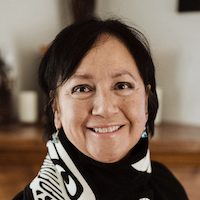
Margaret Pfoh
Administrator

Sandra Turner
Administrator

Lisa Oliveira
Administrator
Committees
While the Board of Directors focuses on governance issues, governance itself cannot be achieved without a thorough understanding of the organization. This is why the Board has four committees that allow their members to share their expertise with the management team.
Allocation Committee
This committee, chaired by Jeff Morrison, provides oversight and guidance to the team regarding the approximately $10 million in annual funding provided by the Centre. Members of this committee bring together a variety of regional and organizational perspectives on community housing that allow for a better understanding of the context in which projects will take place and an assessment of their feasibility and potential impact. This input from the committee members considers and adds to the insights from the team and external reviewers.
In addition, this committee is responsible for ensuring a balance in the distribution of funds based on the Centre’s priorities, as well as Canadian geography and demographics.
Highlights of the work accomplished in 2021–2022 include:
- Meeting the annual CBTIF and STF allocation goals;
- Facilitating the implementation of the Plancher project by pausing the allocation of grants from the Sectoral Impact Fund in Québec;
- Contributing to the redefinition of allocation processes.
Ethics and Governance Committee
Jacques Beaudoin heads this committee. The committee supports and advises management when it comes to analyzing the cost/benefit ratio associated with current operations and the various perspectives being considered in terms of orientation and operations.
The areas of focus for this committee in 2021–2022 are the following:
- Preparation for the allocation process integrity audit;
- Review of the harassment prevention policy;
- Development of a remote work policy.
Nominating Committee
The composition of a Board of Directors of the highest quality cannot be left to chance. The Centre is fortunate to have a Nominating Committee as per its by-laws. It is the responsibility of this committee to identify desirable candidate profiles in order to form a Board of Directors that can meet the requirements for administering an organization such as ours. Not only must the Board have the right mix of expertise, it must also be representative of the diversity present in the Canadian population.
The Nominating Committee, chaired by Sandra Turner, has primarily worked on three issues:
- Selecting two individuals to complete the terms of two Board members
- Preparing for a cycle of Board reappointment, beginning with the June 2022 General Assembly;
- Planning a training program for Board members to ensure that they have all the necessary expertise to carry out their responsibilities.
It is also important to note that there are two non-Board members on this committee. Hugh Lawson and Karen Hemmingson bring expertise in community housing and general professional experience to the Board, as well as provide an external and legitimate point of view on its composition. They also have access to networks that facilitate the recruitment and vetting of high calibre candidates.
Finance and Audit Committee
While money can’t buy happiness, it is essential to manage our money, especially if it is to be used for a common good like community housing.
With transactions of over $10 million per year and financial flows that involve hundreds of organizations and contracts in 13 jurisdictions, it is essential to have controls in place for each transaction and an overview of the overall financial health of the organization.
As Treasurer, Martina Jileckova leads the committee and ensures that it receives all necessary information. But the role of the Finance and Audit Committee goes beyond monitoring. It also has a forward-looking element that allows it to discuss budget planning with management. The committee performs both tasks with rigour and diligence, as confirmed once again this year by the external auditor’s report.
In addition to regular monitoring and interaction with the external audit firm, the committee has taken on a new task in 2021–2022. In response to the rapid evolution and growth of the Centre, the committee, in collaboration with the team, has developed, adopted, and put into action a new annual work plan.
Administration
From a financial point of view, the financial statements as of March 31, 2021, that were audited by the external auditor attest to the quality of the work completed, since neither their opinion nor the notes to the report identified any anomalies. What’s more, the same report indicates a healthy financial situation.
The essential but little-known step of external review
One of the features that distinguishes the Centre from most funders is the involvement of peers in the allocation process.
These volunteers from across the country offer their field of expertise or academic knowledge to provide insight into the relevance, feasibility and potential impact of each project.
Of course, since each project is unique, different reviewers are called upon to provide their specific expertise.
However, it must be recognized that, up to this point, the Centre’s team has not sufficiently recognized and valued the contribution of the reviewers. Too often, reviewers were left to their own devices during the process.
The lack of follow-up, including informing them of changes made to the project as a result of their comments, or of the conclusion of the allocation process and, if applicable, of the project once completed, are all practices that must be corrected.
This neglect undermines the review team’s interests and makes their work seem inconsequential and worthless, whereas it represents one of the strengths of our allocation process.
Consequently, one of the Centre’s administrative priorities in 2022–2023 is to correct this situation and to implement measures that will ensure an improvement in the coming year.
The organizational alignment plan
IT at the service of community housing
In the last quarter of 2021–2022, the Board decided, on the recommendation of management, to invest a significant portion of the organization’s reserves in its digital infrastructure. This major undertaking will serve the Centre well.
In keeping with our encouragement for the sector to pool their resources, we intend to accelerate the pace of agreements with other groups so that they can take advantage of our skills for their own activities.
We already have such agreements with Vivre en ville, the Nova Scotia Community Housing Growth Fund and the Indigenous Centre for Cumulative Effects, and there are many discussions that may well lead to more of these types of agreements in the months and years to come.
This undertaking is not just for the benefit of others. The Centre intends to ensure that the process will improve its own capacity as well.
Ultimately, we hope that this effort will significantly enhance the user experience thanks to a clean design that will seamlessly integrate the various facets of our online services.
Not only will our website, fund application forms, self-assessment tools and other services be more enjoyable to use, they will be more powerful through better integration.
The upgrade will also expand the potential of our systems, facilitating the emergence of new projects and services as well as making it easier for employees to follow up on files and produce reports and analyses.
The team
Our team is made up of energetic and enthusiastic individuals who fundamentally believe in the right to housing, in the importance of supporting housing co-ops and NPOs, and in the possibility of mobilizing and educating tenants to make better-informed choices about housing.
All team members, regardless of in which province they work, are actively involved in the thinking that upholds the successful operation and development of the Centre. They have a keen interest in housing issues, which leads them to take part in many events and training sessions offered by the community.
This year, the team enthusiastically participated in the organizational alignment process and the development of the 2022–2024 action plan.
It is interesting to note that despite the labour shortage, which seems to be an insurmountable obstacle for many employers, each job opening at the Centre generates more applications than the last. This is a sign that the Centre is growing and attracting talent!
The Centre’s staff on March 31, 2022

Stéphan Corriveau
Executive director

Lisa Ker
Deputy executive director

Marie Brouillette
Operations director

Peter Wheeland
Communications director

Solange Garçon
Executive assistant

Andréanne Chevalier
Communications manager

Jeanne Lemba
Communications manager

Lou Seltz
Data manager

Susanne Roethlisberger
Database technician

Sabine Friesinger
Webmaster/ graphic designer

Renée Hébert
Program manager

Brian Clifford
Program manager

Chrissy Diavatopoulos
Program manager

Hope Jamieson
Program manager

Luc Labelle
Program manager

Scott Stager Piatkowski
Program manager

Chris Rootsaert
Program manager
Closing remarks
Our main organizational challenge for the coming year (in fact, the years to come) is to complete our own transformation from a reactive to a proactive organization. Our mission, our strategic plan, our action plan, our expertise, our Board of Directors, our team, our partners and allies, and our financial and technical resources foster a unique context for a group like ours in a time when housing is a top concern for the vast majority of the population including the political sphere.
We must use this context and these powerful assets in a dynamic and empowering way.
Failure to do so would have dire consequences, not only for the Centre, but also for the thousands of organizations in the sector and especially for the millions of people who see the prospect of adequate and affordable housing diminish every day.
Our vision and mandate cannot be achieved by sitting behind our desks, waiting to receive and analyze funding applications from organizations that are often financially strapped and primarily concerned with maintaining their daily operations.
Going forward, the Centre needs to assume more leadership and act as a facilitator and inspiration for the movement.
As society and official institutions continue to neglect Indigenous rights and pretend that climate change will not affect us for decades, we will devote more intelligence and resources to these issues again this year.
Ultimately, in 2022–2023, we intend to evolve our practices, but the motivations and ambitions of the Centre remain exactly the same as they were on day one. This evolution of practices is a testament to the dynamism of the organization and the will to equip ourselves with the means to succeed!
